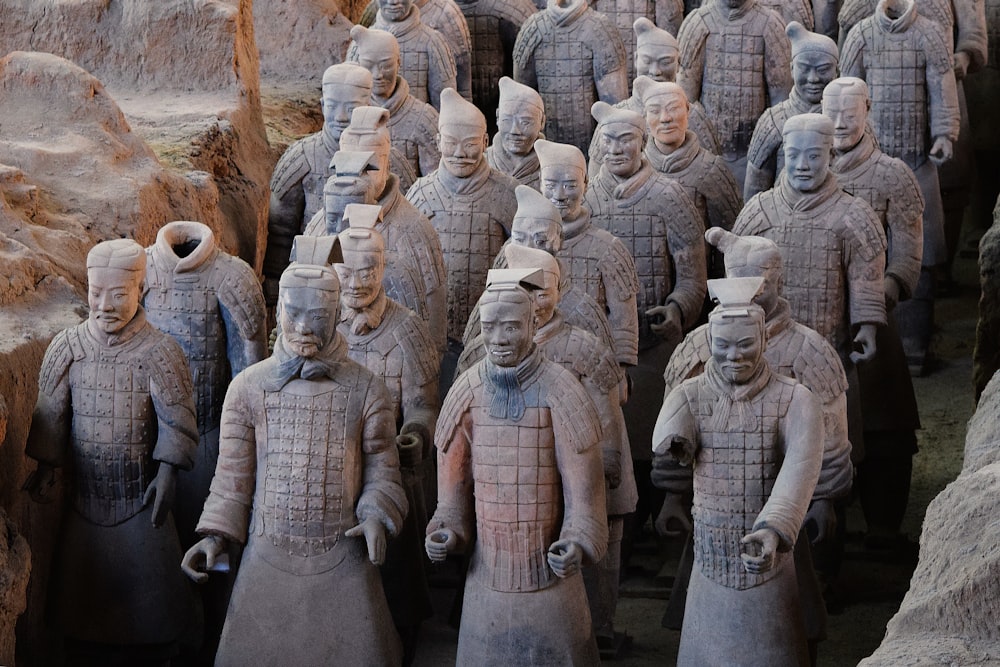Commentary by management consultant Michael Wade on Leadership, Ethics, Management, and Life
Thursday, October 31, 2019
"We don't want your kind here"
The trailer for "The Witcher."
Learning a Craft
Oliver Reed gives some advice to a young actor.
Halloween Can Come at Any Time

"The CEO is contemplating a reorganization."
[Photo by Neven Krcmarek at Unsplash]
Frost on Punkin

This has become an Execupundit tradition:
Kent Risley with a marvelous recitation of the poem.
[Photo by Donna Godsell at Unsplash]
Math is Scary
Political Calculations has the scariest prime number.
Wednesday, October 30, 2019
10 Minutes

Glance at the distant future but don't stare at it.
Your life always depends upon the quality of the next ten minutes.
And then the next and the next....
[Photo by Brad Neathery at Unsplash]
Tuesday, October 29, 2019
No Contest
A Large Regular has found the scariest Halloween pumpkin.
Twenty to Ponder
Cultural Offering has Max DePree's 20 signs of entropy.
I will be printing them off for easy reference.
I will be printing them off for easy reference.
Novels for a Time Capsule

If you were going to put three novels into a time capsule so that people 100 years from now would have a sense of these times, which ones would you pick?
They need not have been recently published.
I'm still thinking about the top three but some current contenders would be, could be, might be:
- The Bonfire of the Vanities by Tom Wolfe
- Back to Blood by Tom Wolfe
- White Teeth by Zadie Smith
- Little Brother by Cory Doctorow
The most recent was published in 2008. What's been written lately?
[Photo by Daniel Lincoln at Unsplash]
[Photo by Daniel Lincoln at Unsplash]
Monday, October 28, 2019
Learning
If you pick up a bee out of kindness, you will learn the limitations of kindness.
- Sufi proverb
- Sufi proverb
Remembering the Asian Flu
In 1957 an Asian influenza pandemic, known as 'Asian flu', constituted the worst global epidemic since the end of the First World War, killing more than a million people in two years, including 16,000 in Britain and 70,000 in the United States.
- From History of the Twentieth Century by Martin Gilbert
[I recall the Asian Flu but didn't realize how many people it killed. Incidentally, Martin Gilbert's book is a great review of significant events.]
- From History of the Twentieth Century by Martin Gilbert
[I recall the Asian Flu but didn't realize how many people it killed. Incidentally, Martin Gilbert's book is a great review of significant events.]
First Paragraph
At five o'clock that morning reveille was sounded, as usual, by the blows of a hammer on a length of rail hanging up near the staff quarters. The intermittent sounds barely penetrated the windowpanes on which the frost lay two fingers thick, and they ended almost as soon as they'd begun. It was cold outside, and the campguard was reluctant to go on beating out the reveille for long.
- From One Day in the Life of Ivan Denisovich by Alexander Solzhenitsyn
[I'm re-reading this. It is as great as the first time.]
- From One Day in the Life of Ivan Denisovich by Alexander Solzhenitsyn
[I'm re-reading this. It is as great as the first time.]
Sunday, October 27, 2019
Find Something Beautiful Today

[Photo by Brigitte Tohm at Unsplash]
Saturday, October 26, 2019
A Downside of the Salvage Business
The trailer for "Ghost Ship."
A Little Agitato for a Saturday Morning
Pianist Valentina Lisitsa plays Beethoven.
One of the comments: "After the performance, the piano smoked a cigarette....."
One of the comments: "After the performance, the piano smoked a cigarette....."
First Paragraph
The neighbor on one side was an old woman living alone. She was deaf and remembered nothing. The house on the other was divided into apartments. The owners were questioned when they returned that evening. One, a middle-aged spinster, remembered music, loud choral music, in the early hours of the morning ten days or so before. She had telephoned the police to complain. Sometime later the music had stopped and she had fallen asleep.
- From The Patriot by Piers Paul Read
- From The Patriot by Piers Paul Read
Friday, October 25, 2019
"You wanna call me that, smile."
The expression comes from The Virginian by Owen Wister. It is believed to be the first western novel. Although I'm not sure if it was the first I am sure that it is a good book.
As I mentioned recently in an exchange of notes with Steve Layman of A Layman's Blog, when I was in high school The Virginian was required reading. The Ox-Bow Incident was another western on the list. I doubt if you can find any high school in the United States that would have those two today.
That's a shame because both books had much to teach about life and courage. We had to read others, of course. There were books by Charles Dickens and Henry James and George Orwell as well as a few others I can't recall. I do know that Kon-Tiki also made the list; a choice that baffles me to this day.
As I mentioned recently in an exchange of notes with Steve Layman of A Layman's Blog, when I was in high school The Virginian was required reading. The Ox-Bow Incident was another western on the list. I doubt if you can find any high school in the United States that would have those two today.
That's a shame because both books had much to teach about life and courage. We had to read others, of course. There were books by Charles Dickens and Henry James and George Orwell as well as a few others I can't recall. I do know that Kon-Tiki also made the list; a choice that baffles me to this day.
Thursday, October 24, 2019
Inadvertent Walking
Think back to when you did a lot of walking and you'll probably recall your school days. I walked to and from high school but easily walked several miles more every school day while in college.
I didn't own a car until law school. [Bigger books, you know.]
In those days of yore, you seldom thought of how much you walked because it was done as a matter of course. It was no big deal and everyone else was doing it.
That may be the secret of walking more: link the walking to a particular task so you focus more on the task and less on the walking.
Side Note: David McCullough's book The Greater Journey: Americans in Paris, covers the period 1830 to 1900. It has some fascinating stories of how much people walked in those days. Truly impressive amounts.
12 Management Thoughts
- Don't hire someone you cannot fire.
- Over time, minor details may receive greater attention than the mission. That may not be not mission creep as much as it is mission dilution.
- Candor is an invisible staff member who should be called upon at every meeting.
- Your most dangerous competitor may be the daily bombardment of distractions.
- Any leader who rushes to blame staff is engaging in self-criticism.
- Basics are rarely simple and essentials are too often regarded as optional.
- People can fight without fighting and flee without leaving.
- It takes a lot of thought to learn how to think.
- Your team is your most important product.
- The greatest power and the greatest ideas are often found in separate offices.
- Knowing it is not the same as doing it.
- Consider how much turn-over there would be if job titles had to be periodically earned.
[For information on what I do, see www.execupunditconsulting.com]
First Paragraph
Outbreaks of hostility against minorities are almost always rooted both in ideas - what the majority thinks about the minority - and circumstances: the ways in which or the terms on which the two groups are interacting at a particular time. In order to explain why the Jews became objects of murderous intentions in the twentieth century, one has to look at both sorts of roots.
- From Why? Explaining the Holocaust by Peter Hayes
- From Why? Explaining the Holocaust by Peter Hayes
Wednesday, October 23, 2019
Some Trace
When the girl at the airport hears the announcement that her plane is starting to board, she turns to the boy who is seeing her off. "I guess this is goodbye," she says.
The noise of the traffic almost drowns out the sound of the word, but the shape of it lingers on the old man's lips. He tries to look vigorous and resourceful as he holds out his hand to the other old man. "Goodbye." This time they say it so nearly in unison that it makes them both smile.
It was a long while ago that the words God be with you disappeared into the word goodbye, but every now and again some trace of them still glimmers through.
- Frederick Buechner, Listening to Your Life
The noise of the traffic almost drowns out the sound of the word, but the shape of it lingers on the old man's lips. He tries to look vigorous and resourceful as he holds out his hand to the other old man. "Goodbye." This time they say it so nearly in unison that it makes them both smile.
It was a long while ago that the words God be with you disappeared into the word goodbye, but every now and again some trace of them still glimmers through.
- Frederick Buechner, Listening to Your Life
"No one will be seated during the last 10 minutes"
The trailer for "The Andromeda Strain."
Comment from the Beach
FutureLawyer makes an observation on my Late Night Thought post.
Nice idea but no. You get more from the thought by writing it down.
It's Not the Talking

The days can be filled with talk.
Phone calls. Emails. Text messages. Good old-fashioned letters. Reports. Small meetings. Team meetings.
It's not the talking that's important. It's what is being talking about.
That and the level of candor.
Subject for next meeting: "Important Stuff We Don't Talk About."
[Photo by sps universal at Unsplash]
First Paragraph
We fondly imagined that everything was going to stay nice and friendly. Four days previously I had returned from Florence where the final negotiations for our capitulation had taken place. I had negotiated with General Clark, drunk champagne, eaten Californian tinned fruit, strolled around in full uniform in the company of Allied officers, and finally I had been flown back to Bolzano in an American plane. Now I was sitting with General Wolf on the terrace of the Royal Villa enjoying the bright Italian sunshine.
- From Nazi Fugitive: The True Story of a German on the Run by Eugen Dollmann
- From Nazi Fugitive: The True Story of a German on the Run by Eugen Dollmann
Tuesday, October 22, 2019
"Oh Happy Day"
A Layman's Blog has, among many other neat things, the Edwin Hawkins Singers.
Political Takes
- The Federalist: Mark Hemingway on Trump and the Beltway.
- Rolling Stone: Matt Taibbi on "Everyone is a Russian Asset."
- The New Republic: Libby Watson on public option bait and switch.
Butterfly Mind

Many of us have butterfly minds. Although well aware of the importance of focus, we are still inclined to fly from subject to subject.
It can be helpful to set aside some "garden time" so your butterfly mind can visit a variety of topics. That time is not a simple diversion. It can provide insights that would not be discovered if you remained focused on a single subject.
[Yesterday, I gleaned some very helpful information while reading about the Roman campaign against Hannibal and then scanning a Bundestag speech on the Holocaust. Both directly contributed to my focus when I shifted to some major projects. It was garden time well spent.]
[Photo by Aaron Burden at Unsplash]
Sacred Territory

The Sovereign Professional has Steven Pressfield's thoughts on your work space.
[Photo by Joshua Coleman at Unsplash]
Reading the West
Outdoor Life has 19 of the best Western novels of all time.
Texas Monthly: A 2013 interview with Larry McMurtry.
Local Tastes
Far & Wide ranks American states by their food.
Judging from the ranking of Arizona, it appears that the author didn't actually have to dine in the state.
Judging from the ranking of Arizona, it appears that the author didn't actually have to dine in the state.
Monday, October 21, 2019
From Reactive to Proactive

The always-interesting (and succinct) Nicholas Bate explains how to make the shift.
[Photo by Simon Migaj at Unsplash]
The Decline of Men's Magazines
Brian Patrick Eha explores the decline of GQ, Esquire and others in City Journal.
I used to subscribe to Esquire back in the Jurassic Period when it was an interesting magazine. It makes me cringe today.
GQ is another one that has seriously dropped. It's more like Wimp Quarterly.
My guess is there is a serious market for men's magazines but to succeed they will need writers and editors with a different mindset: one that is not apologetic about being male.
I used to subscribe to Esquire back in the Jurassic Period when it was an interesting magazine. It makes me cringe today.
GQ is another one that has seriously dropped. It's more like Wimp Quarterly.
My guess is there is a serious market for men's magazines but to succeed they will need writers and editors with a different mindset: one that is not apologetic about being male.
The Brexit Saga
Daily Mail: Historian Andrew Roberts calls for an investigation of how the Parliament has handled Brexit.
First Paragraph
The past is a foreign country: they do things differently there.
- From The Go-Between by L.P. Hartley
- From The Go-Between by L.P. Hartley
The Literary Dinner
All of us are familiar with the ice-breaker of picking famous people we'd like to invite for a dinner party. Here's a twist: which fictional characters would you have at your dinner party?
My choices:
- Dr. Stephen Maturin from the Aubrey-Maturin novels by Patrick O'Brian.
- Hercule Poirot from the Agatha Christie novels.
- Hermione Granger from the Harry Potter books.
- Frank Skeffington from The Last Hurrah by Edwin O'Connor.
- Sherlock Holmes from The Adventures of Sherlock Holmes by Sir Arthur Conan Doyle.
- Clarice Starling from The Silence of the Lambs by Thomas Harris.
- Scarlett O'Hara from Gone with the Wind by Margaret Mitchell.
- Atticus Finch from To Kill a Mockingbird by Harper Lee.
- Dirk Struan from Tai-Pan by James Clavell.
- George Smiley from the John LeCarre novels.
- Wilkins Micawber from David Copperfield by Charles Dickens.
- Sir Harry Flashman from the Flashman novels by George MacDonald Fraser
Your choices?
Sunday, October 20, 2019
Find Something Beautiful Today

[Photo by AussieActive at Unsplash]
Saturday, October 19, 2019
Eloquence and Drama
The British House of Commons debating Brexit.
Update: At The Spectator, Robert Peston provides an analysis.
Update: At The Spectator, Robert Peston provides an analysis.
The Late Night Thought
The thought arrived late and I'd already gone to bed. I regarded it as an important insight on a project.
So important, in fact, that I knew I'd better preserve the idea or I might not remember it in the morning.
I scrawled for a while in a notebook. This morning found the thought - unlike so many late night jottings - looking better than ever.
Capture them while you can.
Friday, October 18, 2019
Never Give Up. Never Surrender.
The trailer for "Never Surrender: A Galaxy Quest Documentary."
Books about the Holocaust

There are, of course, many books on (or related to) the Holocaust. Here are some nonfiction works that I'd recommend checking out:
- The Terrible Secret: Suppression of the Truth about Hitler's "Final Solution" by Walter Laqueur
- The Path to Genocide by Christopher R. Browning
- Hitler's Bureaucrats: The Nazi Security Police and the Banality of Evil by Yaacov Lozowick
- Accounting for Genocide: National Responses and Jewish Victimization during the Holocaust by Helen Fein
- Night: A Memoir by Elie Wiesel
- The Holocaust: A New History by Laurence Rees
- Why? Explaining the Holocaust by Peter Hayes
- Legislating the Holocaust: The Bernhard Loesener Memoirs and Supporting Documents, edited by Karl A. Schleunes
- The Origins of The Final Solution: The Evolution of Nazi Jewish Policy, September 1939-March 1942 by Christopher R. Browning
- The Drowned and The Saved by Primo Levi
- Survival in Auschwitz by Primo Levi
- Facing the Extreme: Moral Life in the Concentration Camps by Tzvetan Todorov
- Becoming Eichmann: Rethinking the Life, Crimes, and Trial of a "Desk Murderer" by David Cesarani
- Interrogations: The Nazi Elite in Allied Hands, 1945 by Richard Overy
- The Nazi Conscience by Claudia Koonz
- Eichmann Before Jerusalem: The Unexamined Life of a Mass Murderer by Bettina Stangneth
- Moments of Reprieve: A Memoir of Auschwitz by Primo Levi
- The Psychology of Dictatorship by G.M. Gilbert
- Ordinary Men: Reserve Police Battalion 101 and the Final Solution in Poland by Christopher R. Browning
- Fathoming the Holocaust: A Social Problems Approach by Ronald J. Berger
- Anatomy of Malice: The Enigma of the Nazi War Criminals by Joel E. Dimsdale
- The Holocaust: The Jewish Tragedy by Martin Gilbert
- Bloodlands: Europe between Hitler and Stalin by Timothy Snyder
- Eichmann in Jerusalem by Hannah Arendt
- Reflections on a Ravaged Century by Robert Conquest
- KL: A History of the Nazi Concentration Camps by Nikolaus Wachsmann
- Into That Darkness: An Examination of Conscience by Gitta Sereny
- Shoah: An Oral History of the Holocaust by Claude Lanzmann
Some novels to consider:
- The Wall by John Hersey
- Treblinka by Jean-François Steiner
- Life with a Star by Jiri Weil
- Mendelssohn is on the Roof by Jiri Weil
- Mila 18 by Leon Uris
- A Meal in Winter by Hubert Mingarelli
Updated with addition of A Meal in Winter and Shoah.]
[Photo by Erica Magugliani at Unsplash]
[Photo by Erica Magugliani at Unsplash]
First Paragraph
Big John Masters was large, fat, oily. He had sleek blue jowls and very thick fingers on which the knuckles were dimples. His brown hair was combed straight back from his forehead and he wore a wine-colored suit with patch pockets, a wine-colored tie, a tan silk shirt. There was a lot of red and gold band around the thick brown cigar between his lips.
- From Spanish Blood, a short story by Raymond Chandler
- From Spanish Blood, a short story by Raymond Chandler
Thursday, October 17, 2019
Hiding Out - Back Soon

[Photo by Tim Mossholder at Unsplash]
Learning from the Ancients

While reading the excellent biography of Scipio Africanus by B. H. Liddell Hart, I have been struck by the Roman general's attention to small details. He left little to chance and was able to turn seemingly small things, such as whether the Carthaginian forces arrayed against him had completed their breakfast, to an advantage.
One memorable decision: While preparing in Sicily for an invasion of north Africa, Scipio conscripts 200 Sicilian youths who are nobly born. They all bring horses and arms. At the same time, he has his officers pick the 200 most promising soldiers from a pool of Roman recruits. The Sicilians are nervous and reluctant to participate in the African invasion. Scipio tells them that he doesn't want half-hearted soldiers and so they won't have to participate provided they train the Roman conscripts in horsemanship and give them their horses and arms. The Sicilians are more than happy to do so.
Scipio winds up with 200 Roman cavalrymen at little expense.
Wednesday, October 16, 2019
Disney Ride Goes Upscale
The trailer for "Jungle Cruise."
Privileged?

Not least among the oddities of this discussion whenever it arises - and this is very common today - is the fact that privilege is an unbelievably hard thing to define. It is also very nearly impossible to quantify. One person may have 'privilege' from inheriting money. For another person this same privilege may be a curse, giving them too much too early and disincentivizing them from making their way in the world. Is a person with inherited wealth but who has a natural disability more privileged or less privileged than a person without any inherited wealth who is able-bodied? Who can work this out? Who would we trust to work it out? And how can the various stratas of this arrangement be flexible enough not just to include everybody in view but also take into account the comparative changes for the better and worse which will occur across every human life?
- From The Madness of Crowds by Douglas Murray
[Photo by Adeolu Eletu at Unsplash]
Tuesday, October 15, 2019
Another Spooky Movie for Your (Not My) Entertainment
The trailer for "The Conjuring."
Harold Bloom, R.I.P.

We read to find ourselves, more fully and more strangely than otherwise we could hope to find.
- Harold Bloom
[Photo by Chris Lawton at Unsplash]
"California Goes Dark"
James B. Meigs explores the state's electricity problem in City Journal.
Time to re-read "Red Wind" by Raymond Chandler. An excerpt:
There was a desert wind blowing that night. It was one of those hot dry Santa Anas that come down through the mountain passes and curl your hair and make your nerves jump and your skin itch. On nights like that every booze party ends in a fight. Meek little wives feel the edge of the carving knife and study their husbands' necks. Anything can happen. You can even get a full glass of beer at a cocktail lounge.
Monday, October 14, 2019
You are Old If You Recall the Books from Childhood
The trailer for "Dolittle."
Too True
FutureLawyer gets a valuable time management lesson from a rat.
Back by Popular Demand
A video of "Ella's Waltz" from "Heaven's Gate."
The Principle

The principle to be kept in mind is to know what we see rather than to see what we know.
- A. J. Heschel
[Photo by Kaleidico at Unsplash]
When the Political Scene Gets Too Weird
It's time to shut it off and revisit the Hercule Poirot series.
No joke.
Style, intelligence, warmth, and civilization await you.
Sunday, October 13, 2019
The Pre-Brexit Version
From the BBC: The trailer for "The War of the Worlds."
Find Something Beautiful Today

[Photo by Dora Reis at Unsplash]
Saturday, October 12, 2019
Tempting
William Cook at The Spectator recommends spending a weekend in Berlin.
Taking a Stand and Revealing Values
Scott Simon on the NBA, free speech, and China.
Embrace Craftsmanship: Slow Down
While exploring the future of work, Tanmay Vora takes us back to craftsmanship.
Remember the motto posted at the Spartak Tennis Club in Moscow:
"Think like a gardener, work like a carpenter."
Friday, October 11, 2019
First Paragraph
Raylan Givens was holding a federal warrant to serve on a man in the marijuana trade known as Angel Arenas, forty-seven, born in the U.S. but 100 percent of him Hispanic.
- From Raylan by Elmore Leonard
- From Raylan by Elmore Leonard
A Nostalgia Moment: The Overhead Projector
Kurt Harden of Cultural Offering recently told me that he has an overhead projector.
He uses it as a prop.
Aargh.
Nonetheless I am filled with envy. In a display of bad judgment several years ago, I gave away my overhead projector.
Later on - amid sober reflection - there was much weeping and gnashing of teeth.
My reasoning at the time was not irrational. A speaker of advanced years with gray hair and an overhead projector might as well have a pocket watch and drive a Nash.
That said, long-time readers of this blog know that I believe the old overhead projectors were, in key respects, far superior to the rigid flashiness of modern PowerPoint.
How so?
The overhead projector permitted far more spontaneous exchanges between the speaker and the audience. If a point needed to be illustrated, it could be easily shown simply by drawing or writing with a grease pencil (or an erasable marker) on an acetate slide.
Because of that option, presenters didn't have to prepare as much as they do with PowerPoint. The PowerPoint presenter needs to craft slides in advance. The presenter using an overhead projector can easily construct and customize a slide right on the spot. Some overlays could be prepared in advance but the real action often occurred when the presenter prepared one in response to audience questions.
Do I use PowerPoint? Yes, for some presentations, but whenever possible I find myself using a flip chart to convey reasoning that once would have been dynamically presented on acetate.
Progress is not always progress.
[BTW: I refer to overhead projectors in my book on How to Make Presentations to Councils and Boards. I will be preparing a revised edition so younger readers won't think that they've uncovered a Trivial Pursuit item.]
"Zeroville": Now on Film
I posted the novel's first paragraph back in April:
On Vikar's shaved head is tattooed the right and left lobes of his brain. One lobe is occupied by an extreme close-up of Elizabeth Taylor and the other by Montgomery Clift, their faces barely apart, lips barely apart, in each other's arms on a terrace, the two most beautiful people in the history of the movies, she the female version of him, and he the male version of her.
- From Zeroville: A Novel by Steve Erickson
Here's the trailer for the film version.
On Vikar's shaved head is tattooed the right and left lobes of his brain. One lobe is occupied by an extreme close-up of Elizabeth Taylor and the other by Montgomery Clift, their faces barely apart, lips barely apart, in each other's arms on a terrace, the two most beautiful people in the history of the movies, she the female version of him, and he the male version of her.
- From Zeroville: A Novel by Steve Erickson
Here's the trailer for the film version.
Thursday, October 10, 2019
Get Ready for Halloween.
The trailer for "The Innocents."
Daily Reminder Needed
"Work expands to fill the time available
for its completion."
- C. Northcote Parkinson
[I have decided to frame "Parkinson's Law" and hang it above my desk.]
The Silent Treatment
What can silence mean?
- They want to avoid you.
- They are waiting to hear from you.
- There's something more pressing going on.
- They want to have additional information or get more work done before they get back with you.
- Others?
Wednesday, October 09, 2019
Miscellaneous and Fast

- Jim Geraghty: We are importing China's values.
- Fortune: The NBA and China.
- Victor Davis Hanson: "The Death of American Citizenship."
- Trailer: "The Assassination of Jesse James by the Coward Robert Ford."
- Rolling Stone: Matt Taibbi on the "whistleblower."
- The trailer for "Curse of the Demon."
[Photo by Aaron Greenwood at Unsplash]
The Lunacy by the Bay

In October 2015, three gutter punks—youth who roam up and down the West Coast colonizing the sidewalks and panhandling—robbed and shot to death a 23-year-old Canadian woman in Golden Gate Park and killed a 67-year-old man a few days later after stealing his car. They were high on meth. The incident appears to have produced no perturbations in San Francisco’s thinking or policy. In August 2019, a 25-year-old homeless addict viciously attacked a woman entering her Embarcadero apartment, after demanding that she let him inside so that he could kill the “robot”—a female concierge—at the reception desk. The presiding judge initially refused repeated requests to hold the suspect in pretrial detention. The San Francisco supervisors may be unwilling to back policies that would help prevent such violence, but they have found time to ban city agencies from stigmatizing the perpetrators of such violence by using words like “felon” or “offender.” Under language guidelines passed in August 2019, criminals and ex-cons will henceforth be known as “justice-involved” persons or “returning residents.”
Read the rest of Heather Mac Donald's City Journal article.
[Photo by James Besser at Unsplash]
In Sober Moments
In sober moments, we know that the Constitution of the United States would mean nothing without the laws that grow out of it and back it up. Without them the rights it promulgates would be no better guaranteed than those enshrined in the old Soviet Constitution, a document that, as the dissident sociologist Alexander Zinoviev suggested, was published only in order to find out who agreed with it, so that they could be dealt with.
- Clive James, Cultural Cohesion: The Essential Essays
- Clive James, Cultural Cohesion: The Essential Essays
Tuesday, October 08, 2019
Deconstructing in Academia
To 'deconstruct' something is as significant in academia as 'constructing' things is in the rest of society. Indeed, it is one curiosity of academia in recent decades that it has found almost nothing it does not wish to deconstruct, apart from itself.
- Douglas Murray
- Douglas Murray
Jobs Off the Trail
I know a man who once worked with the CIA but that was more of an unspoken understanding than a formal relationship. It was known but not mentioned and not to be mentioned. It didn't even rise to the level of the secret college club where the moment someone asked you if you were a member, you were instantly expelled from the club. That way, you could honestly answer, "No, I am not a member."
A surprising number of jobs may be in such territory.
For a Good Scare
Kurt Harden at Cultural Offering lists his contenders for the most frightening movie of all time.
Great choices. I would add The Blair Witch Project.
Sales: Best When Hidden
Like acting, sales works best when hidden. This explains why everyone whose job involves distribution - whether they're in sales, marketing, or advertising - has a job title that has nothing to do with those things. People who sell advertising are called "account executives." People who sell customers work in "business development." People who sell companies are "investment bankers." And people who sell themselves are called "politicians." There's a reason for these redescriptions: none of us wants to be reminded when we're being sold.
- Peter Thiel in Zero to One
- Peter Thiel in Zero to One
Monday, October 07, 2019
"Behavioral Inconsistency"
Survivors of Auschwitz as much as latter-day observers repeatedly point to one trait that was common to all camp guards, even the cruelest ones. That trait was behavioral inconsistency. In the same place, often in the course of the same day or even hour, a person could help one prisoner and, without batting an eyelash, send another to his death. It was not that good and evil had reached some kind of equilibrium - evil had the upper hand, by far - but rather that there was no guard who was wicked through and through. Instead, all the guards seemed subject to constant shifts in attitude and temperament, so much so in fact that there is no better word to describe their behavior than "schizophrenic," even though none of these people, as far as we know, had any specific mental illness. What we have here is the "social schizophrenia" specific to totalitarian regimes. As Primo Levi observes, "Compassion and brutality can coexist in the same individual and in the same moment, despite all logic."
- From Facing the Extreme: Moral Life in the Concentration Camps by Tzvetan Todorov
[I'm reading this now. Fascinating book.]
- From Facing the Extreme: Moral Life in the Concentration Camps by Tzvetan Todorov
[I'm reading this now. Fascinating book.]
Subscribe to:
Posts (Atom)

























